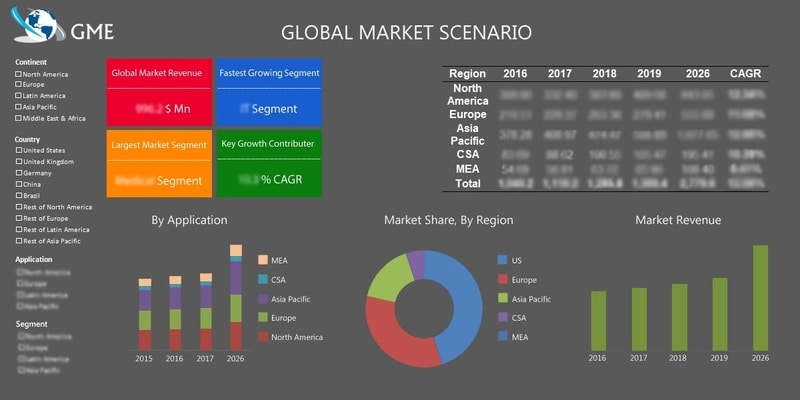
Automated 3D Printing Market - Forecasts to 2026 |GME
Automated 3D Printing Market Insights
The global automated 3D printing market is estimated to witness a high CAGR during the forecast period (2019-2026). Adoption of robotics for industrial automation by manufacturing companies across the globe is expected to drive the market. Increasing focus on efficiency and cost of production in industrial manufacturing is the major factor influencing the market growth. Automated 3D printing systems are used in the production of complex and customized design parts in various end-use industries. The high installation cost of automated 3D printing system and lack of standardization in processes are likely to hamper the market growth during the forecast period.
Automated 3D Printing Market: By Offering
On the basis of offering, the global automated 3D Printing market is segmented into hardware, software and services. The hardware segment is further sub segmented into 3D printers, and robots among others. The robots sub segment is expected to grow at the highest growth rate during the forecast period due to the rapid adoption of robots in industrial settings across the globe. The adoption of robots is increasing in automated 3D printing as they are easily programmable and can perform the tasks at an accelerated pace. The software segment is also expected to grow at a significant CAGR during the forecast period. Growing implementation of automation tools such as selenium, robotium, and watirin among others are expected to drive the market.
Automated 3D Printing Market: By Process
On the basis of process, the market is segmented into material handling, automated production, part handling, post processing and multiprocessing among others. Multiprocessing segment is expected to grow at the highest CAGR during the forecast period. Multiprocessing in additive manufacturing helps to produce parts with high geometric complexity in a very economical manner. Multiprocessing comes with extra functionalities such as machining, cutting, dispensing, and robotic placement among others. These are the major factors driving the market for multiprocessing process. Growing need to automate post processing is expected to drive the market for post processing segment.
Automated 3D Printing Market: By End User
Based on end user, the automated 3D printing market is segmented into automotive, aerospace & defense, industrial manufacturing, high-tech equipment, and engineering, healthcare, consumer products, and energy among others. Industrial manufacturing, high-tech equipment, and engineering segments are expected to register the highest growth during the forecast period. The growing use of new technology of tools to increase the output, product quality and flexibility among others.
Automated 3D Printing Market: By Region
North America is expected to witness considerable growth in the automated 3d printing market during the forecast period. The presence of automated 3D printing equipment manufacturers in the U.S. and the increasing investment in R&D activity is driving the market in this region during the forecast period. Favorable government rules and regulations are also expected to drive the market. Asia Pacific is expected to grow at the highest CAGR during the forecast period. The expanding manufacturing sector and increasing foreign investments in the region are the major factors driving the automated 3D printing market growth. Growing mergers and acquisitions among automated 3D printing software and hardware companies are expected to drive the market in the Asia-Pacific region. Europe is expected to witness a stronger demand for automated 3D printing during the forecast period (2019-2026). The presence of leading automotive manufacturing companies in Germany, and UK are the major factors propelling the market growth in this region.
Automated 3D Printing Market: End Use Landscape
The end-user landscape entails a list of current and prospective consumers prevailing across the regions. This section briefs you about company addresses, contact details, products, and regional presence of companies who are purchasing or are likely to purchase. The key end-users of the markets are Hitachi, Toyota, Bosch and Lockheed Martin among others
Automated 3D Printing Market: Vendor Landscape
The report contains a chapter dedicated to vendors operating in the automated 3d printing market, covering raw material manufactures, equipment developers, manufacturers, and distributors. The report provides these insights on a regional level. This section of the report entails contact details, experience, products manufactured/supplied, and geographical presence of companies.
Automated 3D Printing Market Share & Competitor Analysis
Some of the key players operating in the automated 3D printing market are Stratasys, ExOne, 3D Systems, Universal Robo, Materialise, EOS GmbH, Formlabs, Concept Laser, SLM Solutions, Coobx, Authentise, and Renishaw among others.
Please note: This is not an exhaustive list of companies profiled in the report.
In June 2019, Exone announced a partnership with Siemens to bring industry 4.0 to industrial 3D printing.
In May 2019, Stratasys has signed a partnership agreement with Solvay to introduce new FDM materials in the market.
Check the Press Release on Global Automated 3d Printing Market Report
We value your investment and offer free customization with every report to fulfil your exact research needs.
The global liner hangers market has been studied from the year 2017 till 2026. However, the CAGR provided in the report is from the year 2018 to 2026. The research methodology involved three stages: Desk research, Primary research, and Analysis & Output from the entire research process.
The desk research involved a robust background study which meant referring to paid and unpaid databases to understand the market dynamics; mapping contracts from press releases; identifying the key players in the market, studying their product portfolio, competition level, annual reports/SEC filings & investor presentations; and learning the demand and supply side analysis for the liner hangers market.

The primary research activity included telephonic conversations with more than 50 tier 1 industry consultants, distributors, and end-use product manufacturers.

Finally, based on the above thorough research process, an in-depth analysis was carried out considering the following aspects: market attractiveness, current & future market trends, market share analysis, SWOT analysis of the company’s manufacturing liner hangers, and customer analytics.

Tailor made solutions just for you
80% of our clients seek made-to-order reports. How do you want us to tailor yours?
OUR CLIENTS